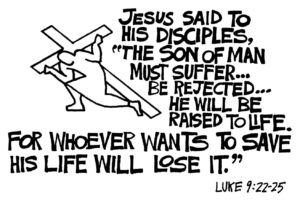Here’s another collaborative Franciscan Gospel Sharing post. This weekly Sunday Gospel reflection and questions are written by Fr. Paul Gallagher, OFM. They are edited by Sister Anne Marie Lom, OSF and Joe Thiel. The excerpts from the Sunday readings are prepared by Joe Thiel. If you would like to read or download the complete pdf with excerpts for your prayer, please click here: Franciscan Gospel Reflections September 3 2017 Excerpts from the Lectionary for Mass for Use in the Dioceses of the United States of America, second typical edition © 2001, 1998, 1997, 1986, 1970 Confraternity of Christian Doctrine, Inc., Washington, DC. Used with permission. All rights reserved. No portion of this text may be reproduced by any means without permission in writing from the copyright owner.
Photo: Holy Angels Parish, West Bend ‘Washed Rainbow’
Mt 16:21-27
From that time on, Jesus began to show his disciples that he must go to Jerusalem and suffer greatly from the elders, the chief priests, and the scribes, and be killed and on the third day be raised. Then Peter took him aside and began to rebuke him, “God forbid, Lord! No such thing shall ever happen to you.” He turned and said to Peter, “Get behind me, Satan! You are an obstacle to me. You are thinking not as God does, but as human beings do.”
Then Jesus said to his disciples, “Whoever wishes to come after me must deny himself, take up his cross, and follow me. For whoever wishes to save his life will lose it, but whoever loses his life for my sake will find it. What profit would there be for one to gain the whole world and forfeit his life? Or what can one give in exchange for his life? For the Son of Man will come with his angels in his Father’s glory, and then he will repay everyone according to his conduct.
Background:
In the gospel text from last week, Peter stated that he believed that Jesus was “the Christ, the Son of the living God.” Jesus responded to Peter by telling him that he was blessed, and that his [Jesus’] heavenly Father had been the source of that revelation. That Gospel ended with Jesus strictly ordering the disciples not tell anyone that he was the Messiah. This Sunday’s gospel text follows immediately.
In this text, Jesus was teaching the disciples that he was not the kind of Messiah that most people were expecting. Verse 21 makes it clear that he would suffer, die, and be raised from the dead, and that the religious leaders of the day would be involved in the events that would unfold. These events would take place in Jerusalem, the center of both religious and civil authority for Jews. The religious leaders mentioned were from the Sanhedrin, the highest court in the Jewish nation. This body of leaders had permission from Rome to function as a religious authority. Matthew seems to be implying that Jesus was viewed as a threat, and not only to Rome’s civil order. He had also disturbed the religious leaders enough that they were seeking a way to have him put to death. In a culture where one’s status and existence depended on being part of a network of relationships, and where privacy was not valued, it would have been almost impossible for Jesus and the disciples not to have heard rumors of the plot against Jesus.
The culture and the lived reality of day focused almost exclusively on the present. People of the day did not think in terms of the future and the world of possibilities. A pregnant woman might think about the birth of the child. A farmer may plan for the harvest of a crop that was already beginning to grow. Even Jesus, when he spoke about the coming of the Kingdom of God, sounded like it had already begun to take place and would come into its fullness very soon. So here, when Jesus was speaking of his future fate in Jerusalem, it should be understood that he was speaking as a person with same understanding of the future as the people of his day.
The short dialogue between Peter and Jesus also should be understood from the culture of the day. While Jesus and the disciples would have been aware that the religious authorities were trying to discredit Jesus, and even considering his demise, Peter likely clung to some belief that as the Messiah, God would not permit any harm to happen to him. When Peter expressed his faith and trust in God to Jesus, Jesus responded to him as one who would have him abandon what he understood, as his role was to be faithful and obedient to God, even if it meant suffering and his own death. Jesus’ honor was to be found in being faithful to the will of God. Salvation history was filled with men and women who had endured great suffering and even death in their service of the will of God. Jesus’ own cousin, John the Baptist, had given his life rather than be untrue to what he believed God was asking of him.
Recall too that in the desert, Jesus had wrestled with Satan, who tempted him to use his divine powers to change his human reality and to display his divine authority. He resisted that temptation at that time. During his public life, he was challenged to perform signs that would demonstrate his authority. He refused. Now Peter was suggesting that Jesus somehow escape from the fate that his life and preaching had brought. Jesus called Peter “Satan,” or the one who was acting as an obstacle to God’s will. He was making it clear to Peter and to his disciples that he was totally committed to be faithful to the path he had chosen. Those who would try to persuade him from that path in any way were acting like Satan in the desert.
Reflection Questions:
- What is your attitude toward pain and suffering? Can you think of different times when you have both avoided pain and suffering, and when you have knowingly done things that you knew were going to painful?
- What is the most difficult kind of pain for you to endure? Are there also types of pain for which you seem to have a high tolerance?
- Do you know people whose primary mode of living seems to be “avoid all pain at all cost”?
- Have you ever chosen a life course that you knew was going to upset people and even make your life more difficult, if you chose one way of acting over another? What was that time of decision-making like for you? How did that decision affect how you think about yourself today?
- Have you ever acted as though not talking about or not thinking about some dire consequences would prevent them from happening?
- Have you ever acted out a hope that good and loving God-fearing will lead to a tranquil and well-ordered life?
- What do you think Peter was feeling as this situation unfolded?
- What do you think would have happened if Peter had said in response: “How else do you expect me to think? I am human, only human, and will always be human. I am frustrated when you expect me to think like anything other than a human!”
- Do you ever find yourself believing that God may be upset with you?
- Can you take some time to talk to God about how God looks upon you and your efforts to be in an honest and faithful relationship, or anything else that rises within you from this text?



